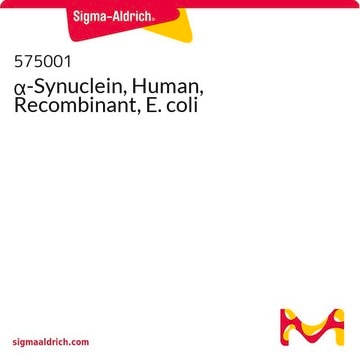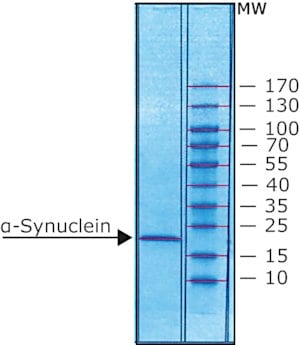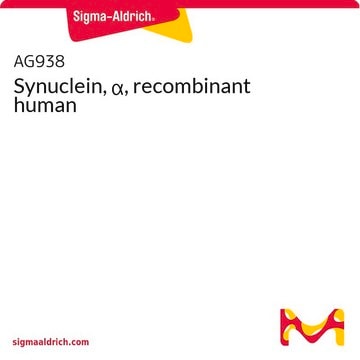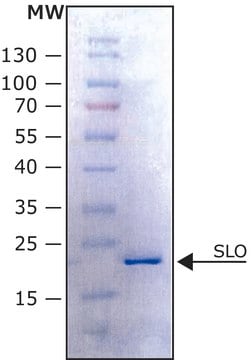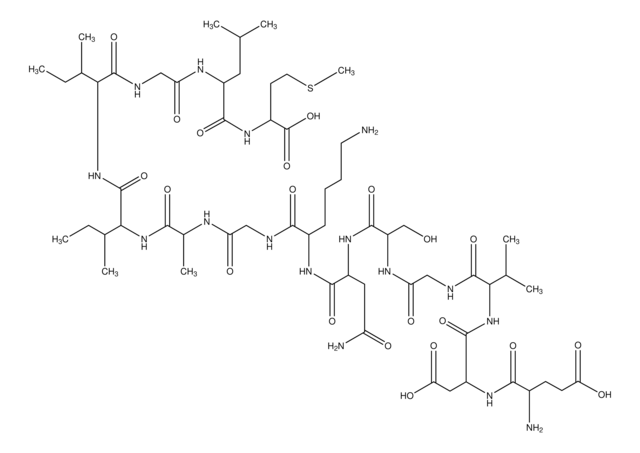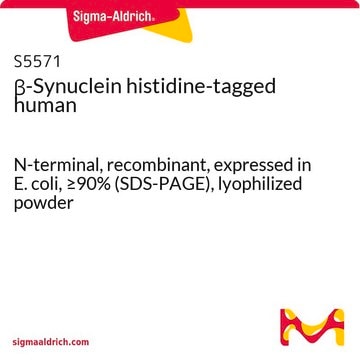S1071
α-Synuclein A53T human
recombinant, expressed in E. coli, N-terminal histidine tagged, ≥90% (SDS-PAGE), lyophilized powder
Iniciar sesiónpara Ver la Fijación de precios por contrato y de la organización
About This Item
Productos recomendados
recombinante
expressed in E. coli
Nivel de calidad
Análisis
≥90% (SDS-PAGE)
formulario
lyophilized powder
Nº de acceso UniProt
Condiciones de envío
dry ice
temp. de almacenamiento
−20°C
Información sobre el gen
human ... SNCA(6622)
Descripción general
α-Synuclein is mapped to human chromosome 4q22.1. It is an intrinsically disordered protein with N-terminal imperfect repeats (KTKEGV), a central NAC crucial for aggregation and an acidic rich flexible C-terminal region.α-Synuclein is present in the Lewy bodies (LBs) and Lewy neurites (LNs).
Aplicación
α-Synuclein A53T human has been used to treat mesencephalic neuronal and stimulate microglial cells prior to reactive oxygen species (ROS) measurement, immunohistochemistry and imaging studies.
Acciones bioquímicas o fisiológicas
α-Synuclein (α-Syn) interacts with toll-like receptor 2 (TLR2) and mediates interleukin-1β (IL-1β) synthesis.
A point mutation in the α-synuclein gene, A53T (Ala53-Thr), is linked to familial Parkinson′s disease. Mice expressing A53T human α-synuclein, but not wild-type or the A30P variants, develop adult-onset neurodegenerative disease with a progressive motoric dysfunction leading to death.
Código de clase de almacenamiento
11 - Combustible Solids
Clase de riesgo para el agua (WGK)
WGK 3
Punto de inflamabilidad (°F)
Not applicable
Punto de inflamabilidad (°C)
Not applicable
Equipo de protección personal
Eyeshields, Gloves, type N95 (US)
Certificados de análisis (COA)
Busque Certificados de análisis (COA) introduciendo el número de lote del producto. Los números de lote se encuentran en la etiqueta del producto después de las palabras «Lot» o «Batch»
¿Ya tiene este producto?
Encuentre la documentación para los productos que ha comprado recientemente en la Biblioteca de documentos.
Mehmet Ozansoy et al.
Molecular neurobiology, 47(2), 460-465 (2012-11-28)
Parkinson's disease (PD) is the second most common neurodegenerative disorder, defined by the presence of resting tremor, muscular rigidity, bradykinesia, and postural instability. PD is characterized by the progressive loss of dopaminergic neurons within the substantia nigra pars compacta of
Nathan Meyer et al.
ACS central science, 8(4), 441-448 (2022-05-05)
The detection to α-synuclein (αS) assemblies as a biomarker of synucleinopathies is an important challenge for further development of an early diagnosis tool. Here, we present proof of concept real-time fast amyloid seeding and translocation (RT-FAST) based on a nanopipette
A short motif in the N-terminal region of α-synuclein is critical for both aggregation and function.
Ciaran P A Doherty et al.
Nature structural & molecular biology, 27(3), 249-259 (2020-03-12)
Aggregation of human α-synuclein (αSyn) is linked to Parkinson's disease (PD) pathology. The central region of the αSyn sequence contains the non-amyloid β-component (NAC) crucial for aggregation. However, how NAC flanking regions modulate αSyn aggregation remains unclear. Using bioinformatics, mutation
Human alpha-synuclein-harboring familial Parkinson's disease-linked Ala-53? Thr mutation causes neurodegenerative disease with alpha-synuclein aggregation in transgenic mice
Lee MK, et al.
Proceedings of the National Academy of Sciences, 99(13), 8968-8973 (2002)
Yan Zhou et al.
Molecular neurodegeneration, 11, 28-28 (2016-04-17)
α-Synuclein (α-Syn), a pathological hallmark of Parkinson's disease (PD), has been recognized to induce the production of interleukin-1β in a process that depends, at least in vitro, on nod-like receptor protein 3 (NLRP3) inflammasome in monocytes. However, the role of
Nuestro equipo de científicos tiene experiencia en todas las áreas de investigación: Ciencias de la vida, Ciencia de los materiales, Síntesis química, Cromatografía, Analítica y muchas otras.
Póngase en contacto con el Servicio técnico